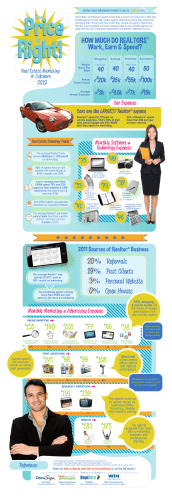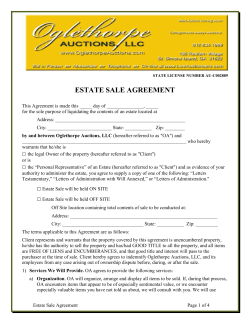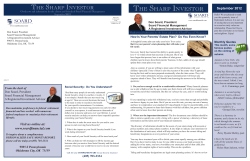
New Agent N Pull-Out: Reference Guide
Chicago REALTOR® _ SPECIAL INSERT FEBRUARY 2005 • Page 1A Pull-Out: Reference Guide New Agent N ewly licensed agents have a lot to learn to succeed in the real estate business. This resource guide will give those new to the business that extra nudge to get started on the right track. PROSPECTING – How Do You Find Clients? Begin implementing these tips today! What to Do in the First 3 Months No matter how slick your brochures, business cards, hardware, and personal marketing plan, the key to successfully launching your business is acquiring clients. Follow these tips to find prospects: Make sure all family, extended family, and friends know that you’re working in real estate sales and are available for their buying and selling needs. Send them your new business card and personal brochure and follow up with a friendly phone call in the first few weeks. If you’re involved in community organizations, activities, or other personal interest groups, be sure to let everyone in those groups know of your new career. Inform members of your religious congregation, your children’s sports leagues, your doctor, your insurance agent, your dry cleaner, and other service providers. Find a high-producing sales associate in your office and offer to assist him or her with open houses or other aspects of his or her transactions to gain experience and possible referrals. Consider joining the sales team of a high-producing practitioner until you can establish your own client base. Article courtesy of the National Association of REALTORS® Offer to work floor time in your office in order to answer incoming calls and find prospects. If your company has a general e-mail box, offer to respond to incoming e-mail inquiries from potential prospects. Develop contacts with the human resources departments of any major employers in your area and offer your services for relocating employees. Contact organizations that you’re involved with or that interest you and offer to provide free homebuying seminars to its members. inside: 2A | Advice from the 2004 Rookies of the Year 3A | Money & Budget Management 101 Page 2A• FEBRUARY 2005 SPECIAL INSERT_ Chicago REALTOR® Pull-Out: Reference Guide Advice from the 2004 Sales Awards Rookie of the Year Winners Questions & Answers with Kevin Asher, Baird & Warner – Rookie of the Year for Central Chicago Region Kevin Asher ASHER: Knowing what you want is empowering... it gives you the ability of figuring out what it takes to succeed. Do you 'want' to be successful, or are you 'going' to be successful? The difference is where you find the opportunity. Most importantly, always be an optimist. CR: How did you become so successful? ASHER: I put everything on the line when I got into this business. After waiting tables for eleven years, I chose to give up the profession entirely so I could dedicate all of my time to real estate. I chose the #1 office with the best broker in the city and I never looked back. I worked as much as possible with all of the tools available to me, tirelessly devoted to building my business. My initial goal was to be rookie of the year at Baird & Warner, so evidently my ambition carried me a little further. CR: What do you wish you would have known as a new agent that you know now? ASHER: Everything. Seriously... then It would have been a lot easier! You have to start somewhere, though. CR: What advice would you give to brand new agents? Questions & Answers with Janelle Dennis, @properties – Rookie of the Year for North Chicago Region Janelle Dennis CR: How did you become so successful? DENNIS: Follow up on every lead, every prospect you’re given, even if they seem insignificant or small. I had a floor call from a buyer wanting to spend $199,000 for a new construction condo. I found them a great place and, while we were writing up the contract, they told me theit family owned a brick 2-flat in Wicker Park they wanted to sell. I sold it for $500,000. Less than a year later the same $199,000 buyer and his brother bought an investment rental condo with me for $275,000. Pursue every lead. Every client can lead to a repeat buyer and great refer- rals to build your business. Apply smart, professional principles to the way you conduct your business. Buying real estate is one of the biggest investments that any person makes, whether they are buying a $200,000 first condo or a million dollar home. Treat your clients as if you were their financial advisor on the biggest investment of their lives. Treat them with that level of respect. Do that kind of professional analysis on whether it’s a good investment – as if you were buying it for yourself. If you show your clients that level of respect, you will turn $250,000 first time buyers in to $500,000 repeat clients. It’s personality, baby! Success in real estate is about good relationships – with your varied clients, with all types of agents, with many your business partners – attorneys, mortgage brokers, inspectors, developers – with lots of personalities and different priorities. Good communication skills and a professional, but fun approach will win every time. CR: What do you wish you would have known as a new agent that you know now? DENNIS: I now know how to do things so much faster than I did my first year. I wish I had known all the short cuts right away! Most important is just doing the work – getting the actual experience of working with clients, in all the different neighborhoods throughout the city, facing a challenge and finding a creative solution, just get out there and start working it. Learn from more experienced agents. Ask smart questions. Observe good agents in action in the office or at open houses. Take someone you respect to lunch to pass ideas by them. Start working with every buyer or seller who gives you the opportunity. There is nothing better to teach you than real world experience … just do it! CR: What advice would you give to brand new agents? DENNIS: It’s important for all new agents to work smarter, harder, and more professionally than you did before. Follow up on every lead, every prospect. Be more professional than anyone else. Prepare to be successful – if you prepare your business, extra copies of your buyer’s packages, marketing and advertising samples for your listing presentations, templates to help you do your CMAs, attorney faxes, contract summaries and searches faster. Then when you get the opportunity to handle twice as many buyers as you think you can, you’ll be ready to do it. Top 7 Mistakes New By Terry Watson Learn what pitfalls to avoid early in your career and get a successful start in real estate. In Trump: The Art of the Deal, entrepreneur Donald Trump gives his own take on what it takes to succeed in real estate: If you take care of the downside, the upside will take care of itself. In other words, if you have a contingency plan for everything that can go wrong, you can’t help but succeed. You may not end up as wealthy as The Donald, but you should approach your real estate sales career with the same attitude: if you know the top mistakes that prevent real estate professionals from realizing their full potential, you can avoid them — and take your career further, faster. Here are what I believe are the top seven hurdles that could stand between you and a successful real estate career. No Business or Marketing Plan. If you went into business for yourself and approached a bank for a business loan, your loan officer would want to see two things: 1) your income statement and 2) your business plan. Well, when you go into real estate sales, you are going into business for yourself. But many salespeople have no clear goals or timeline for achieving their goals. Consistently, real estate professionals who have a written business plan are more successful than people who don’t. If you don’t know where to start, you can copy a sample real estate business plan from Palo Alto Software Inc.’s Business Plan Pro. The company also offers Marketing Plan Pro. Not Using Available Resources. Even if you’re new to the industry, you don’t have to recreate the wheel. Take advantage of all the resources that are around you — from your brokerage, your colleagues, and professional organizations. Find top performers in your market or other markets and ask them to mentor you. Not Maximizing Your Productivity. If you look at top-producing real estate professionals who are selling 600-plus units a year, you will notice that they have two things in common: assistants and systems. These practitioners are multiplying their efforts and increasing their output through people and technology. According to the 2003 NATIONAL ASSOCIATION OF REALTORS® Member Profile, real estate practitioners who used at least one personal assistant had a significant- ly higher sales volume than those who didn’t. You may erroneously think that you can’t afford a personal assistant. But think again. If you can significantly increase your income by increasing your efficiency and the number of transactions you can close in a year, you can’t afford not to get a personal assistant. Not Earning REALTOR® Designations. Many practitioners feel that they aren’t making enough money to allocate funds for education. This is backwards thinking. You take the class to acquire the skills to increase your sales and earn more. The skills you learn and the referral relationships you develop with other students you meet will dramatically affect your bottom line and your potential for success. Not Purchasing Equipment as a Business Entity. Many real estate professionals purchase their laptops, digital cameras, or PDAs as consumers. This is Chicago REALTOR® _ SPECIAL INSERT FEBRUARY 2005 • Page 3A Pull-Out: Reference Guide Money & Budget Management 101 By Haley M. Hwang How you deal with the unpredictability of getting paid in real estate – and how you spend that money – can determine your success. Remember in your old job where you just had to show up and you would get a paycheck every other week or every month? All your taxes were taken out for you and what you had left was what you could spend? Ahh, those were the days. But now, you’re in real estate sales — and getting paid is an imprecise concept with no guarantees. There are no regular paychecks, tax withholdings, or automatic retirement savings. Yet, no one tells you when you get into the business how to effectively budget and manage your money so that you optimize your chances for success. And ultimately, how you make these budgeting decisions will impact your success in real estate, according to some real estate trainers who teach practitioners about budgeting. Following are some of their secrets to effectively budgeting and managing your commission income — so that it catapults you to financial stability and success. Budgeting Tips • Start immediately on a debtreduction plan. Strive to have your debt be as close to zero as possible, says Terry Watson, ABR, CRB, president of Watson World Inc., a real estate and leadership training company in Chicago. Watson says that if you are overly burdened with debt, you will not make smart business decisions in real estate because you’ll feel a tremendous pressure to make money. Planning and Marketing for the Residential Specialist course – believes that you should have an additional savings of 10 percent to 15 percent for personal marketing expenses, such as advertising, business cards, and website. • Set aside a business reserve. In addition to the money for personal expenses, you also should set aside some money in reserves (it can be as little as $100 per month) for unexpected business expenses, says Chuck Bode, CRS, GRI, broker-associate with N.P. Dodge Real Estate Co. in Omaha, Nebraska. “If something breaks down, you go into the reserves and you don’t Continued on page 4A • Build up a safety cushion. You should be able to cover your monthly expenses for three to six months without making a paycheck, says Robert Morris, ABR, CRB, a broker with Prudential Rowland Real Estate Inc. in Murfreesboro, Tennessee Morris – who teaches budgeting, business plan development, and cost plan analysis as part of the Council of Residential Specialists’ Business Practitioners Make. a big mistake. If the technology breaks or you need help with the device, you will be sent to consumer purgatory, also known customer support. When you call customer support as a consumer, expect to waste at least an hour of your day. This purgatory is completely avoidable and unnecessary. The next time you purchase equipment, buy it as a business entity. You can do this by stating that you are a business when you purchase the equipment in-store, choosing the business ordering option online, or using the business-ordering phone number through companies like Dell. When you purchase equipment as a business, your customer support will be much better and less time-intensive. When you need help, you can call a support line that is reserved for business accounts. That means that you only spend about five minutes on the phone with ONE person, and the needed part or parts are sent overnight. In some cases, you can even get a technician dispatched to your home or office to personally fix the problem. Not Targeting Your Marketing to Your Prospects’ Concerns. If you don’t already own a copy, you need to run out and immediately get the 2004 National Association of REALTORS® Profile of Home Buyers and Sellers. This survey gives you insights into what really matters to the typical buyer and seller. The typical mantra used in the real estate industry is, “I am honest, hardworking, and have sold millions of dollars in real estate.” According to the 2003 survey, the average homebuyer or seller doesn’t care about your accomplishments. What they do care about is finding the right house, negotiating, and obtaining help with the paperwork. Your marketing should target their concerns. Obtain a copy by calling the NAR at 800.874. 6500 or order it online. No Income Buffer, Passive Income, or Nest Egg. What often kills new real estate practitioners is the concept of lag time. When you sell a house, you typically don’t get paid when the contract is accepted. The average contract is written for 45 days. In a perfect world, you would get your commission check 45 days from the date it was accepted. In the real world, you don’t always get paid on time. What could go wrong? Maybe someone forgets to order the title, water certification, village inspection, pay-off letter, survey, termite inspection, or income verification. If you are in a hot market, the title company could be backed up for two weeks or longer. The closing date could be pushed back days or even weeks. A successful real estate practitioner needs a line of credit and a financial cushion of three to six months of personal expenses to survive. You also need passive income — or income coming in from investment property so that you don’t have to be desperate to close a deal. When that check finally arrives, don’t forget to put some money aside for your nest egg. Usually it is the simple stuff that derails a potentially successful real estate career, eclipses your joy in helping consumers find a home, or causes practitioners to burn out prematurely. You are where you are today because of decisions you have made or did not make. Before you embark on a real estate career—or before you try to move your career to a new level of production—take a hard look at yourself and see if you’ve been guilty of any of these mistakes. Then make the decision to not make them again. Once that decision is made, your path to real estate sales success is wide open. Article courtesy of the National Association of REALTORS® Page 4A• FEBRUARY 2005 SPECIAL INSERT_ Chicago REALTOR® Pull-Out: Reference Guide Money & Budget Are You Sold on Real Estate? Management 101 Before you can sell homes to others, you have to be sold on the idea of a real estate career. By Mark Nash The sharp contrast of a booming real estate market and a sluggish economy has brought literally thousands of new associates to residential sales over the last few years. The business certainly looks enticing: the freedom to create your own schedule, to be in control of how much you earn, and to operate your own business. But if you believe that this rosy picture is the whole story, you or some well-meaning friend has sold you a bill of goods. Industry estimates say that anywhere from one-third to three-quarters of new real estate practitioners leave the business in their first three years. Many more struggle along making just enough to survive but never enough to reach the income level they want. If you fall into either of these categories, it might be time to make an honest assessment of whether you have the skills needed to have a successful career in real estate sales. • Do you have excellent people skills? People skills are the No. 1 factor in real estate sales success. If you dread picking up the phone for fear it’s a client, you may be in the wrong business. To be successful in sales—and to really enjoy it—you need to like and respect all personalities, ethnic groups and lifestyles. (Failing to do so also may put you in violation of fair housing laws.) You must be able to quickly build rapport with clients and to enjoy helping them solve problems and reach their goals. Your people skills also are essential for building and maintaining good working relationships with other sales associates, mortgage and title professionals, and property appraisers and inspectors. • Do you have a confident personality? Especially when you’re getting started, you need the emotional resilience to handle rejection. When you’ve just given what you know was the best listing presentation of your career and the prospects says they’ll have to think about it, it takes a strong sense of self-worth to go on to the next presentation and do it all over again. It’s also critical that you can put your own personal issues aside when you work and focus on the needs of the client. • Are you comfortable with technology? Technology is increasingly driving the real estate business. You will need to have or learn to use, at a mini- mum, a personal computer, digital camera, e-mail, and software programs to create effective marketing pieces and communicate with clients. You don’t need to be a geek, but you can’t shy away from technology and hope to succeed. • Do you read, write, and speak well? Even though real estate sales involves a lot of personal contact, you need to be able to read, comprehend, and often explain contract forms, policy and procedures manuals, and disclosure statements. You’ll also need good basic grammar and spelling skills for marketing materials and routine correspondence. • Are you self-motivated and well organized? Because real estate salespeople work as independent contractors with little supervision, the discipline to work on a regular schedule is vital. Good time-management skills also are important in ensuring that you devote the majority of your time to incomeproducing activities. In general, you should spend 25 percent of your time to marketing yourself and your listings and 15 percent in showing current listings to buyers. Organizational skills also are necessary for keeping track of the many details that make up a real estate transaction. • Are you flexible? The trade off for being able to set your own schedule and take two hours off in the middle of the day is the need to work weekends, evenings, and other times when your clients are available. You—and your family—need to understand these demands on your time and how they will impact your lifestyle. • Are you healthy? Although there is a lot of phone work in real estate, you also have to have the physical stamina to spend long periods in your car, lift heavy for-sales signs, and stand for several hours at an open house. As you can see, or already know, real estate is a very demanding career that requires a lot from you. But if this list seems intimidating, don’t sell yourself short. You can learn to adopt many of these skills even if you don’t currently possess them. Ultimately, it’s up to you whether you succeed or fail in this business. But when you do truly buy into the hard work it takes to excel at real estate sales, you’ll find that the rewards are without limits. Article courtesy of the National Association of REALTORS® Continued from page 3A borrow money on a credit card at 15 percent interest,” Bode says. • Have a business line of credit. “Any good business should have a business line of credit,” Watson says. This will give you the financial buffer you need so that you don’t feel the pressure to push every deal through, regardless of whether it’s in the best interest of your clients. • Spend 10 percent on personal marketing. Even when money is tight and you can barely pay your bills, you need to spend money on personal marketing so that you maintain an income pipeline. “You need to spend money to make money in real estate,” says Mark Nash, author of Original New Agent's Guide to Starting & Succeeding in Real Estate and Reaching Out: The Financial Power of Niche Marketing. A broker associate with Coldwell Banker Residential, Central Street Office, in Evanston, Illinois, Nash teaches a course through Coldwell Banker called “Next Level” for second-year salespeople. In addition to the 10 percent on personal marketing, Nash recommends spending 2 percent on technology, 1 percent to 2 percent on accountants and business professionals, and 1 percent on continuing education (including attending real estate conferences and getting additional training). • Determine the biggest payback. Analyze where you’re spending money and how much you get back in terms of generated income over the course of a year, says Bode, who also teaches budgeting in the CRS course. “Some people find that certain things they do have a $15 to $20 per $1 spent payback, says Bode, “That’s a real revelation. Most practitioners don’t know what works and what doesn’t work, so they do it all.” • Budget for education. “Most people go into real estate to make money,” Bode says. “They say that they can’t afford money to take education (attending state and national conventions or taking designation courses). But they can’t afford not to.” Money Management Tips • Track your expenses. Keep a detailed log of everything you spend for a month or so to see where your money goes, Watson says. You may not realize that you’re spending $400 on lattes. • Anticipate your income and work backwards. If you want to make $50,000 this year based on what you think you need to live on, then figure out what you need to do to achieve that income, Morris says. • Find creative ways to save money. Watson says that he has an unlimited plan on his cell phone; has always bought cars that are tan, white, or silver because the forgiving colors save him almost $1,000 in car washes each year; opted for higher deductibles on his car insurance; and buys wrinkle-free clothes that don’t require frequent cleaning. Spend more to last longer. Especially when it comes to buying technology, the cheapest thing may not be the best in the long run, Watson says. If you spend a little more and it lasts longer, it may save you money over the long term. Article courtesy of the National Association of REALTORS®
© Copyright 2026









